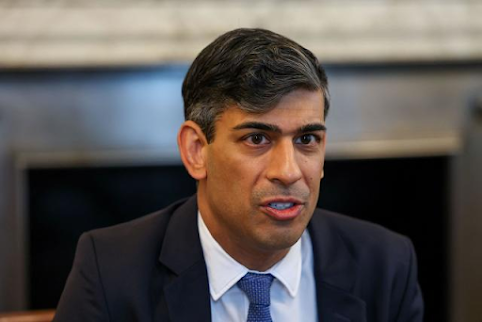Rwanda bill passes
 |
| Rishi Sunak (Photo: Yahoo News) |
The Safety of Rwanda bill was finally passed last night when the House of Lords meekly surrendered, meaning that summary deportation will shortly become law.
It is difficult to see any advantages to this scheme, other than perhaps saving Rishi Sunak's political skin. Even that seems temporary. The inefficient, immoral and frankly eye-wateringly expensive plan is not designed to "stop the boats" - it is too impractical to address the actual problem. Instead it is just another gimmick aimed at appeasing right-wingers.
In short, this is one of the most shameful episodes in British political history. I won't go into detail about how inhuman the bill is - others have done that far better than I could - but it's galling to hear Home Secretary James Cleverley, in apparently celebratory mood, mocking "false human rights claims" when there are very real outstanding concerns around human rights. Protecting vulnerable individuals from potentially being sent to places where they will experience harm is not some "false" position. Cleverley also turned on the ECHR - that favourite Conservative bogeyman - and stated that the government has no intention of complying with European law.
That is what we've become as a nation. The best thing that can be said is that the Conservative Party has become an inspiration for the anti-immigration far right across Europe.
For a while last night it seemed that the House of Lords would make life difficult for the government. However, the Commons obstinately refused to consider amendment after amendment until only one was left standing - Lord Anderson's Motion A1, which questioned the proposal that courts must "conclusively" treat Rwanda as a "safe country" and sought to make such status the subject of a decision by the Secretary of State. It was an utterly sensible amendment that recognised the importance of introducing a parliamentary mechanism for designating Rwanda a "safe country" and acknowledging that situations can and do change. But it was too much for the Conservatives - anything that may delay flights even slightly had to be opposed.
The government conceded on one point - in relation to Afghan veterans - but otherwise its obstinacy won the day.
All this is supposedly "the will of the people". Well, it's not mine. As I'm sure the government will find out at the next General Election, this isn't actually much of a vote winner. Even Reform UK's Richard Tice has hit out at the Rwanda plan, pointing out that it “will not be what the government wants, which is a deterrent... [policing the waters] would be so much cheaper than what the government's doing".
Lord Anderson (Crossbencher) roundly criticised the government's proposals in the Lords, arguing that "the benefits of the Rwanda bill remain to be seen", that "its costs will be measured not only in money but in principles debased" and that it "avoid[s] statutory protections for the vulnerable". He condemned the "disregard for our international commitments" and "the removal of judicial scrutiny over the core issue over the safety of Rwanda".
"We are concerned over the safety of Rwanda both in the present and in the future. This bill is honest about neither...The Rwanda bill is a legal fiction that makes the law look like an ass, and those who make it, asses" he said. It was a tremendous intervention that highlighted the multiple flaws in government thinking. And, in the final analysis, it was utterly futile.
Shortly before midnight Peers opted to give way to the elected House. All the government needed to do in the end was to reject every constructive amendment that the Lords put forward. I've often been a champion for the role the Lords does, but when it cannot stand up for the basic rule of law what is its purpose? For many watching last night it must have seemed like the Lords is a waste time and money. Watching the Lords offering some principled opposition before a total climbdown on the basis that's what unelected chambers should do in the circumstances certainly made a strong case for electing the Lords, but that wasn't the purpose of the exercise - at crucial moments, we need a second chamber that has the authority and the nerve to tell the Commons that it needs to rethink. Last night was such an occasion.
We have a UK government that is now brazen in its disregard of the House of Lords, the Supreme Court and the European Courts. That Rishi Sunak is prepared to die on this particular hill tells you everything you need to know about him and his leadership.
It will be a hollow victory for the Prime Minister unless he can "stop the boats", which of course this bill was never designed to do. It will deliver a few token flights of course, to the outrage of many, but won't get to grips with the problem it is ostensibly created to resolve.
This shameful law should be short-lived, but that depends on what Labour does next. Labour has consistently opposed the Rwanda asylum plan in Parliament and must now commit to scrapping it if, as expected, it forms the next government after the General Election. In the coming days and weeks it needs to make clear that it will repeal this reprehensible law when it has the opportunity to do so. The new law deserves to become little more than a footnote in history, a memorial stone to a failed Conservative government than has run out of ideas - but that can only happen if Labour commits itself to offering more than critical words.
Comments
The next Labour government will only have 172 out of 788(plus Sunak's resignation list!) in the Lords. I suspect the Lords will soon be far more intransigent than they have been in the last two decades. No convention is safe.